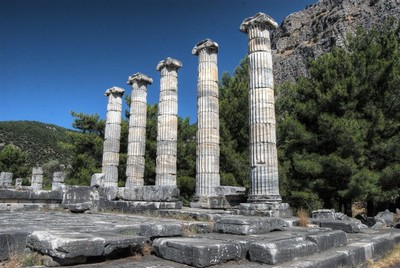Turkish Prime Minister Ahmet Davutoglu has announced a financial support package for the tourism sector, which has been shaken by geopolitical tension in the region.
In the press conference held yesterday to announce a “2016 Tourism Action Plan”, Davutoglu said there would be numerous advantages and support schemes ranging from grant-in-aid to long-term loans for tourism companies.
“We will provide to our industry 255 million Turkish liras ($86 million) of grant-in-aid within action package,” Davutoglu said. “We are also delaying the sector’s debt payment of 288 million Turkish liras [and implementing] a right to extend the maturity date of payments to three years.”

View of Bodrum harbor
The action plan also offers a $6,000 subsidy per flight for tourism agencies from what is known as the “Group A” between April 1 and May 31. “Group A” tourism agencies can offer tickets for all types of transportation as well as arrange tours.
Moreover, accommodation and sea tourism facilities such as boat tour companies and entertainment venues that generate foreign exchange earnings of more than $750,000 last year, will benefit from advantages generally offered to export companies. The threshold was $1 million last year.
Davutoglu added that a spare budget allowance would be used for these financial aids, and this would not constitute an additional burden to the economy.
“There is no reason to panic with regards to tourist numbers; precautionary measures are being taken,” Davutoglu said. “We already provide support to the tourism sector. I do not expect any contraction in the tourism sector.”
Tourist numbers to Turkey have seen steady declines since August last year. The slip in numbers has further deepened after Turkish fighter jets downed a Russian warplane that had violated Turkish airspace.
The number of tourists coming to Turkey dipped by 22.6 percent in the last quarter of 2015 year-on-year to 8.11 million while tourism revenue slipped 14.3 percent to $6.57 billion.
Meanwhile, according to the Ministry of Culture and Tourism, the total number of ‘foreigners’ arriving in Turkey fell for each of the last five months in 2015: August (-2.88%); September (-2.31%); October (-4.02%; November -0.53%); and December (-7.29%).
 The main driver of the decline was the fall in the number of Russian tourists. After the fighter jet incident, Moscow imposed various sanctions in numerous areas including tourism.
The main driver of the decline was the fall in the number of Russian tourists. After the fighter jet incident, Moscow imposed various sanctions in numerous areas including tourism.
According to data from the Turkish Culture and Tourism Ministry, Russian tourist numbers have declined by18.5 percent in 2015, compared to previous year, to 3.65 million.
Tourism finances more than half of Turkey’s current account deficit, based on figures from 2014, which is seen as one of the country’s biggest economic weaknesses.
Davutoglu said he expected Russian tourists, with whom southern beach towns such as Alanya and Antalya are popular, to keep coming to Turkey, despite their government’s stance.
Tourism revenues in Turkey dropped 14.3 percent in the final quarter of last year. Full-year tourism revenues fell 8.3 percent, according to the Turkish Statistics Institute.
Tour operator TUI this month reported a 40 percent drop in summer bookings to Turkey due to safety concerns.
Eight cruise companies – MSC, Costa, Thomson, Aida, Crystal, Norwegian Cruise Line, Oceania Cruises, Regent Seven Seas Cruises – have cancelled cruises to Turkey because of security concerns, according to the Chamber of Commerce of Izmir, a coastal district.
Having said all of this, Turkish duty free and travel retailer ATÜ Duty Free saw sales boom in 2015, rising by +17% to reach €667.2m ($753m), while its 50% owner, TAV Airports, broke the €1bn revenue barrier ($1.13bn) for the year.